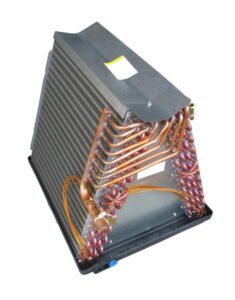While there are many critical components in an air conditioner, it is the refrigerant itself which does the job of absorbing heat from inside your home and carrying it outside to be released. Your AC unit was manufactured with all the refrigerant it should need for its entire lifetime. It doesn’t need to be refilled … unless you have a refrigerant leak.
How do refrigerant leaks happen? How can you tell if your AC’s refrigerant is leaking? And what needs to be done about it? Here’s all the information you need.
How Refrigerant Leaks Occur
It’s possible for the coils which contain the refrigerant to be damaged directly, for example if they were hit by debris in a storm. It’s even possible for the coils to be damaged during a botched DIY or amateur installation, which is a good reason to always have AC installation done by trained, qualified professionals. But most of the time, it’s good old-fashioned wear and tear that is the true culprit. The refrigerant is continually evaporating and condensing, expanding and contracting, and changing dramatically in temperature. This puts a lot of strain on the coils that contain it, and eventually, a crack can develop.
Problems Refrigerant Leaks Cause
Perhaps the most obvious concern is that with less refrigerant, your air conditioner can pull less heat from your home. This also leads to inefficiency, so in addition to failing to keep your home as comfortable as it once did, an AC unit with a refrigerant leak will cost you more to operate. Ice can build up on the evaporator coil, which is part of the indoor unit, and when it melts it can cause water damage. And worst of all, lack of refrigerant puts a lot of strain on the compressor, which is the hardest-working and most-expensive component of the air conditioner. If that goes on for too long, you’ll have to replace the whole unit.
How to Tell If Your Refrigerant Is Leaking
- Sound: The leak of refrigerant may be accompanied by a hissing or bubbling noise.
- Smell: The refrigerant itself has a sweet, chemical smell that you might notice.
- Ice: Your evaporator coils may freeze over.
- Cost: Your utility bills will go up as your air conditioner works harder to keep your home cool.
- Performance: Despite trying harder, your air conditioner won’t be as effective at cooling.
- Short Cycling: Your air conditioner may turn on and off much more frequently.
What to Do about a Refrigerant Leak
If your AC unit was manufactured before 2010, there’s a chance that it may contain a refrigerant called R-22 which is no longer being produced. In that case, replacement is your only option. But in most other cases, it’s quite straightforward to address a refrigerant leak with air conditioner repair in Duluth, GA. A qualified AC technician will inspect your coils, find the source of the leak, and patch it. The coils will be refilled to replace the lost refrigerant. And your air conditioner will be ready to get back to doing its job right!
Reach out to Wall Heating & Air Conditioning, Inc. for all your AC repair needs.

